Wells to readers saying I should stop wiggling around and stick to my guns about predicting the Best Picture Oscar…fuck that. This is a crazy year, nothing is adding up, nobody knows anything and if the wind changes or I pick up a fresh scent or hint of some turn, I’m going to listen to that and re-calculate accordingly. Stating once again: my final, final call is for Little MIss Sunshine to win the Big Prize. And that’s really and truly it. No more changing my mind unless some new, wild-ass revelation hits me this afternoon.
Finke responds to Pond
Deadline Hollywood Daily‘s Nikki Finke has responded to The Envelope‘s Steve Pond‘s saying some of her Oscar show spoiler calls are wrong by saying she was right when she reported them but that some bits have been changed or dropped at the last minute, partly in response to her having spoiled them in her column. She goes over every forecast, bit by bit…here it is.
Spirit pics
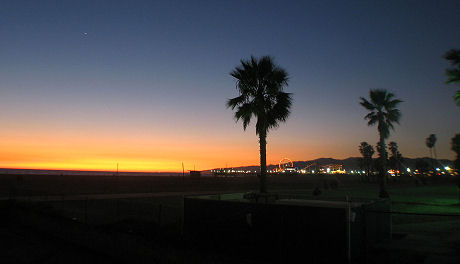
Standing outside Shutters upon leaving the Spirit Awards after-party and looking northwest — Saturday, 2.24.07, 7:10 pm
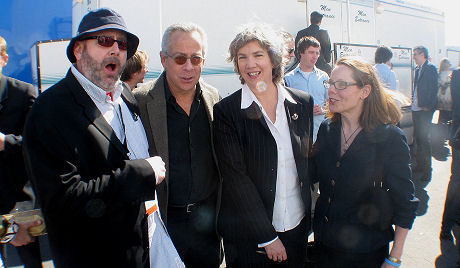
Int’l House of Publicity chief Jeff Hill, Newsweek critic David Ansen, Hollywood Reporter columnist Anne Thompson and Landmark Theatres marketing & sales executive Madelyn Hammond outside the Spirit Awards tent — Saturday, 2.24.07, 1:22 pm
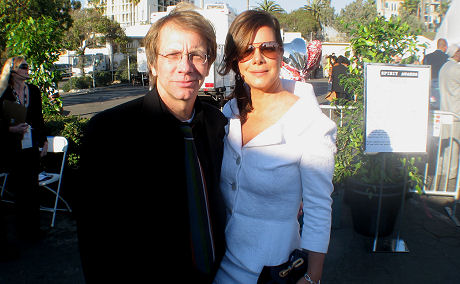
Producer Ron Nyswaner, Spirit Award Best Actress nominee (for American Gun) Marcia Gay Harden — Saturday, 2.24.07, 4:18 pm

Maria Full of Grace director-writer Joshua Marston & friendly significant other at Shutters after-party
Best Celebrity Impersonation
“A rash of recent Oscar winners have been rewarded for playing real people, from Ray Charles to Truman Capote to June Carter Cash,” reads the NPR promo copy for Pete Hammond‘s just-posted aural report. “Are the acting categories turning into best imitation of a real celebrity life?” Obviously. The Academy clearly prefers handing out awards to actors playing real-life people, i.e., those whom viewers know quite well for their voices and tics and body language. Hammond suggests the creation of a new Oscar category — Best Celebrity Impersonation.
Finke is wrong about some things?
Hold on…more Steve Pond swat-downs of Nikki Finke‘s previously posted Oscar show spoilers. The Envelope‘s Tom O’Neil has just spoken to Pond and been told that “a lot of her stuff is either misleading or wrong.”
Wrongo #1: Finke “claims that each of the Dreamgirls will sing each others’ songs — that’s misleading,” says Pond. “All I can really say is that the number is very collaborative, but if you love Beyonce singing ‘Listen’ or Jennifer Hudson singing ‘Love You, I Do,’ you’re not going to be disappointed.”
Wrongo #2: “It’s true that one of the supporting awards will not be handed out in the first third of the show,” says Pond, “which is the usual, but if you break the show into thirds, there’s one acting award in the first third, one acting award in the middle third and two acting awards in the last third.”
Wrongo #3: Finke has written that the Oscar show will “kick off with an extensive and inspired piece of CGI trickery” and that “dead wrong,” says Pond. “There is no extensive and inspired piece of CGI trickery in the Oscar show. There may be something in the pre-show. I’m not sure. But there is nothing like that in the show.
“The show starts off with a film by Errol Morris that involves all of the nominees. Otherwise, Ellen DeGeneres does not appear doing anything with movie scenes. She’s not dancing with the Happy Feet penguins. The Happy Feet penguins make two appearances in the show. Neither of them involves Ellen. As I say, maybe there’s something in the pre-show, but not in the regular show.”
“LMS” for Best Picture
The hell with it: I’m switching my Best Picture prediction to Little Miss Sunshine.
An older friend told me this morning “it’ll probably be The Departed,” pointing the tendency of older Academy members to shy away from comedies in choosing Best Picture winners plus the lack of Sunshine Best Director and Editing noms, blah blah.
I say throw out the stats. The bottom line is that we’re living in weird times. Everyone knows the world is coming to an early end unless some big changes, and Bill Maher was totally dead-on the other night when he said that if people knew or an absolute fact that not using their TV remotes would eliminate global warming completely, that most people would still use their remotes. And yet people are also quietly freaking inside and want a measure of emotional comfort more than anything else when it comes to anything and everything, including the matter of Best Picture.
So the hell with the precedents and stats — Little Miss Sunshine is the only “us” movie with a Best Picture nomination. It’s not as moralistic or grounded as Billy Wilder‘s The Apartment, but that was a “dark comedy” that won the Best Picture Oscar 46 years ago. Sunshine is light-ish, yes, but it’s fundamentally a serious comedy about losing, hurting, despair and darkness, but finally about family love and sticking up for one another, and I think it’s going to win because of this combination. I really do. If I’m wrong, screw it….I don’t care.
Final Best Picture deliberations
If the Best Picture choice of the majority is going to be/has been about selecting the film with the most accessible emotional current (i.e., one that fulfills and satisfies by affirming some commonly-shared realization about life as Academy members know it), then Little Miss Sunshine is going to win the Best Picture Oscar tonight. “If,” I say…
We all know that the statistics are against it with Jonathan Dayton and Valerie Faris not having been nominated for Best Director and the film also not receiving a Best Editing nomination. I don’t know how to calculate this…nobody knows. At the very least tonight’s Oscar show is going to be the best in many years because of the Best Picture headscratcher factor. It’s a real cliffhanger and a puzzler.
Repeating the basics: my personal preference is for The Departed to win because it throttled me in a richer, artier and more dazzling way than any other film. But I’d be perfectly delighted if Little Miss Sunshine takes it because it resonates thematically, it understands itself perfectly, and scene-for-scene and line-for-line it shoots one bulls-eye after another (except for the motorcycle cop-and-the porn magazine bit and the deux ex machina of the ex-boyfriend at the gas station).
One thing for sure (I think, I suspect…maybe) is that I was probably wrong in predicting Babel to win Best Picture. It’s almost definitely going to be The Departed or Little Miss Sunshine, and I have to make a final, final call within the next few hours.
“Litttle Miss Sunshine” wins & wins
Little Miss Sunshine won the Spirit Award for Best Picture yesterday, and with that an extra-special hooray for Academy-snubbed producers Albert Berger and Ron Yerxa, who ought to take the stage tonight at the Oscar and when LMS wins Best Picture. Sunshine helmers Jonathan Dayton and Valerie Faris also won for Best Director, and Sunshine author Michael Arndt won for Best First Screenplay.
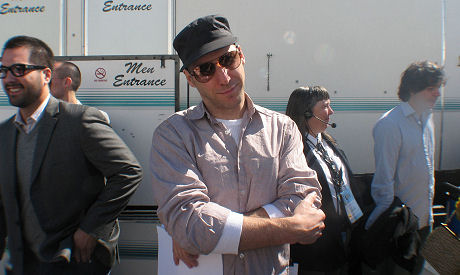
Little Miss Sunshine screenwriter Michael Arndt prior to yesterday afternoon’s Spirit Awards — Saturday, 2.24.07, 1:15 pm
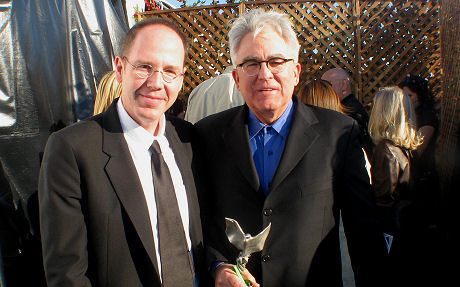
Sunshine producers Albert Berger, Ron Yerxa after the big Sunshine wins — Saturday, 2.24.07, 4:12 pm
“Others” wns at Spirits
The wi-fi in the big Spirit Awards tent was twitchy — worked, didn’t work, sorta worked — so I threw up my hands after 40 minutes or so of futzing around. And then it was party time at Shutters for two, two and a half hours, and then a 90-minute horizontal…forget it. I blew it, slacked off, dropped the ball and, from a filing perspective, basically shined my Hollywood Elsewhere responsibilities.
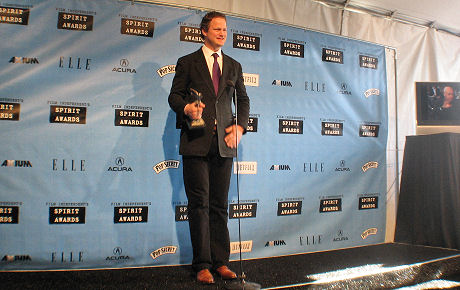
The Lives of Others director-writer Florian von Henckel Donnersmarck fielding questions in the rear press tent at the Spirit Awards — Saturday, 2.24.07, 3:25 pm
But a 20-gun salute to Florian Henckel von Donnersmarck and The Lives of Others for having won the Spirit Award for Best Foreign Film. The odds, of course, have been telling us for several weeks that the great Pan’s Labyrinth will take the Best Foreign Language Film Oscar tonight, but I’m sticking with The Lives of Others on my ballot, even if it means losing money. Because Others has, for me, a better, more satisfying ending.
Spirit winners so far…
I’m not revealing anything if you’re watching the Spirit Awards on IFC, but it’s 3:36 pm — the show’s been running for 90 minutes — and the winners so far that I admire and care about a lot are (a) Little Miss Sunshine‘s Alan Arkin, Best Supporting Male; (b) Michael Arndt, Best First Screenplay, Little Miss Sunshine; (c) Frances McDormand, Best Supporting Female for Friends With Money; Shareeka Epps, Best Female Lead for Half Nelson; Florian von Henckel Donnersmarck, director-writer of The Lives of Others, winner of the Spirit Award for Best Foreign Film; and Guillermo Navarro, winner of the Best Cinematography Spirit Award for Pan’s Labyrinth.
IFP Spirit Awards
I’m heading over to Santa Monica and the Spirit Awards tent around 11 ayem or so, Stand-up, stroll-around schmooze time happens between 12 noon and 2 pm, which is when the show goes on the air on IFC channel (5 pm eastern). There’s also some kind of live webcast thing going on via www.ifc.com.

I’m bringing the laptop with a hope that some kind of wi-fi will be available. The Bagger says he’ll be blogging from the press area so maybe he knows something. If the wi-fi”s happening I’ll do my best with the pictures and potshots. I don’t know about blogging from the big, noisy, super-crowded after-party at Shutters — that may be pushing it.
Verniere’s “Zodiac” review
“The first, flat-out great film of 2007, David Fincher‘s spine-tingling Zodiac is a 158-minute, decades-spanning movie about one of America’s most notorious serial killers,” writes Boston Herald critic James Verniere. “This is the GoodFellas of psycho-killer thrillers.
“A remarkably accomplished, measured and mature procedural, Zodiacis to Se7en — Fincher’s 1995 breakthrough effort — what the real-life case is to Dirty Harry, Don Siegel‘s great, lurid 1971 classic, featuring a Zodiac-like killer played by Andy Robinson.
“In many ways, Zodiac is Se7en stripped of its exploitation trappings, creepy credit sequence and twist ending and transformed into a great American crime epic.
“Fans of Se7en and Fight Club may be befuddled by this somber, ambiguous work. Zodiac unfolds in a creepy, real retro-world, where jurisdictional anomalies and bad record-keeping make life miserable for the good guys. The film is a tale set in an Analog Age when crime detection is the stuff of shoe leather, ink, paper and pastel-blue, rotary dial phones.
“The truth is out there, all right, and it will kill you.”

